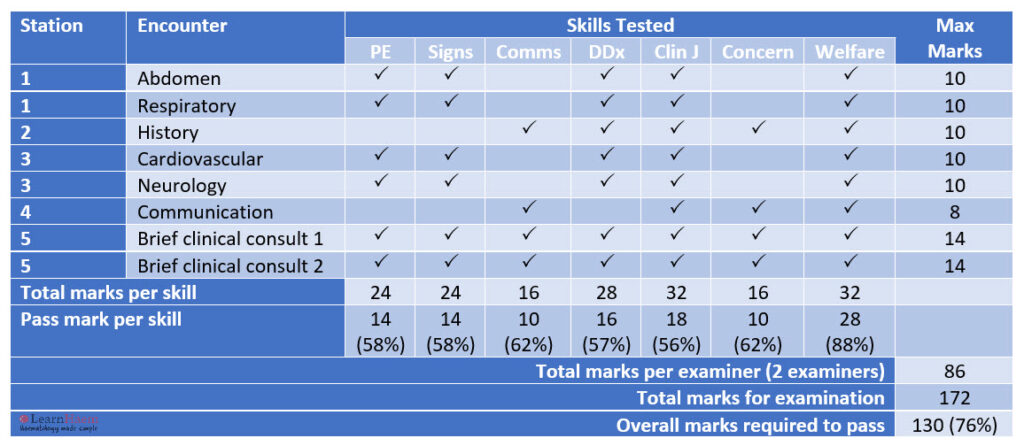This course is designed to aid doctors who are preparing for the Membership of the Royal College of Physicians (UK) PACES examination. Certain sections (e.g. legal aspects) are targeted at candidates sitting the examination in Singapore. While every effort has been made to verify the accuracy of the content here, please do bear in mind that medicine is a dynamic subject. If you spot any inaccuracies, please do comment or contact us.
This information is accurate as of the February 2021 examination. Please note that exam regulations, marking schemes and formats are subject to change. You are advised to look at the MRCP(UK) website for any changes / further details.
In This Section
Structure
- 5 stations, each 20 minutes
- 5 minute gap between each station
- Station 1: respiratory and abdominal examination (10 minutes each)
- 6 minutes for physical examination, 4 minutes for questions
- Station 2: history-taking
- 14 minutes for history-taking, 1 minute for reflection, 5 minutes for questions
- Station 3: cardiovascular and neurological examination (10 minutes each)
- 6 minutes for physical examination, 4 minutes for questions
- Station 4: communication skills and ethics
- 14 minutes with patient, 1 minute for reflection, 5 minutes for questions
- Station 5: brief clinical consultation 1 and 2 (10 minutes each)
- 8 minutes for history, examination and addressing patient concerns
- 3 minutes for history
- 3 minutes for examination
- 2 minutes to address patient concerns
- 2 minutes for discussion with examiner
- 8 minutes for history, examination and addressing patient concerns
Skills Tested
A. Physical examination
- Demonstrate correct, thorough, systematic, appropriate, fluent and professional technique
- For station 5: focused examination
B. Identifying physical signs
- Identify signs correctly
- Does not and not pick up physical signs which are not present
C. Clinical communication
- Elicit a systematic, thorough, fluent history relevant to the patient’s complaints
- Elicits presenting complaint, systems review, past, family and medical history
- Does so in a systematic, fluent and professional manner
- Assesses the impact of symptoms on patient’s occupation, lifestyle and activities of daily living
- Explain relevant clinical information in an accurate, clear, structured, comprehensive, fluent and professional manner
D. Differential diagnosis
- Create a sensible differential for a patient that the candidate has personally assessed
- Differential should include the correct diagnosis
E. Clinical judgment
- Select or negotiate a sensible and appropriate management plan for the patient, relative or clinical situation
- Select appropriate investigations or treatments for the patient
- Negotiates this plan with the patient or relative
- Apply clinical knowledge, including knowledge of law and ethics, to the case
F. Managing patients’ concerns
- Seek, detect, acknowledge and address patients’ or relatives’ concerns
- Listen to a patient or relative and demonstrate empathy
- Confirm a patients’ or relatives’ understanding of the matter under discussion
G. Managing patients’ welfare
- Treat a patient or relative respectfully and sensitively
- Has a manner that ensures their comfort, safety and dignity
Marking Scheme
- Each tested skill is scored as:
- 0: unsatisfactory
- 1: borderline
- 2: satisfactory
- Each station assesses different skills:

- In order to pass PACES, the following must be fulfilled:
- Achieve overall score of 130/172 (76%)
- Pass each of the seven assessed clinical skills:
- A. Physical examination: 14/24 (58%)
- B. Identifying physical signs: 14/24 (58%)
- C. Clinical communication: 10/16 (62%)
- D. Differential diagnosis: 16/28 (57%)
- E. Clinical judgment: 18/32 (56%)
- F. Managing patients’ concerns: 10/16 (62%)
- G. Managing patients’ welfare: 28/32 (87%)
- If only 28/32 is scored for skill G, overall performance will be reviewed by the clinical examining board, and regardless of total score, the candidate may still fail.
Course Content
Station 1: Abdomen
Station 1: Respiratory
Station 2: History Taking
Station 3: Cardiovascular
Station 3: Neurology
Station 4: Communication
Station 5: Brief Clinical Consult


Leave A Comment